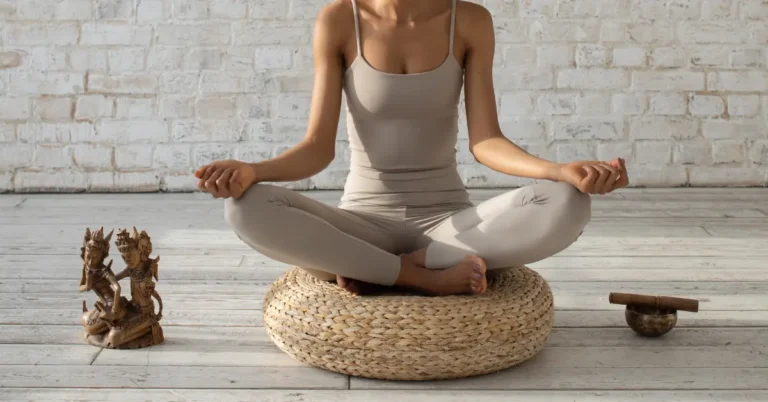As someone who has struggled with anxiety for years, I know firsthand how difficult it can be to fall asleep when your mind is racing with worries. Guided sleep meditation has been a game changer for me, and I’m excited to share what I’ve learned with others who may be struggling with anxiety-related sleep issues.
Guided sleep meditation is a technique that involves listening to a recorded meditation while lying in bed. The meditation typically includes calming music or nature sounds, as well as a soothing voice that guides the listener through a series of relaxation exercises. The goal is to quiet the mind and relax the body, making it easier to fall asleep and stay asleep throughout the night.
For those with anxiety, guided sleep meditation can be especially helpful because it provides a structured way to quiet the mind and focus on the present moment.
Pros ✅
✅ The cushion set includes an extra free cover
✅ Filled by 100% top-grade buckwheat hull
✅ Layer of foam offers a soft landing
Cons 🚫
🚫 The velvet cover may not be as durable as the cotton cover
🚫 The cushion may be too firm for some users
Understanding Guided Sleep Meditation & Anxiety
As someone who has experienced anxiety, I understand how overwhelming it can be. Anxiety is a natural response to stress, but when it becomes excessive, it can interfere with daily life. Anxiety disorders are the most common mental health disorders in the United States, affecting approximately 40 million adults.
Anxiety can manifest in many different ways, including physical symptoms such as sweating, trembling, and rapid heartbeat. It can also cause racing thoughts, difficulty concentrating, and feelings of dread or impending doom.
There are many different types of anxiety disorders, including generalized anxiety disorder (GAD), panic disorder, social anxiety disorder, and specific phobias. Each disorder has its own unique symptoms and triggers.
Guided sleep meditation can be an effective tool for managing anxiety. By focusing on the present moment and practicing relaxation techniques, guided sleep meditation can help calm the mind and reduce feelings of anxiety.
It’s important to remember that anxiety is a treatable condition. If you are experiencing symptoms of anxiety, it’s important to seek help from a mental health professional. With the right treatment, you can learn to manage your anxiety and live a fulfilling life.
The Science of Guided Sleep Meditation

I have always been fascinated by the human mind and how it works. One area that has particularly intrigued me is the science of sleep meditation. Sleep meditation is a form of guided meditation that is designed to help people relax and fall asleep. It involves listening to a guided meditation recording that is specifically designed to help you calm your mind and body, and drift off into a peaceful sleep.
Research has shown that sleep meditation can be an effective way to reduce anxiety and improve sleep quality. In fact, a study published in the Journal of Sleep Research found that participants who listened to a sleep meditation recording fell asleep faster and had better quality sleep than those who did not listen to the recording.
So, how does sleep meditation work? When you listen to a sleep meditation recording, it can help to slow down your breathing, lower your heart rate, and relax your muscles. This, in turn, can help to reduce feelings of anxiety and stress, and make it easier for you to fall asleep.
Sleep meditation can be particularly helpful for people who suffer from anxiety. When we are anxious, our bodies release stress hormones like cortisol, which can make it difficult to fall asleep. By practicing sleep meditation, we can help to reduce the levels of cortisol in our bodies, and promote feelings of relaxation and calm.
The science of sleep meditation is still relatively new, but the research that has been done so far suggests that it can be an effective way to reduce anxiety and improve sleep quality. If you struggle with anxiety or have trouble sleeping, it may be worth giving sleep meditation a try.
Benefits of Guided Sleep Meditation for Anxiety

As someone who has struggled with anxiety, I have found that guided sleep meditation can be a helpful tool in managing symptoms. Here are some of the benefits I have experienced:
- Relaxation: Guided sleep meditation can help calm the mind and body, allowing for a deeper sense of relaxation. This can be particularly helpful for those who struggle with racing thoughts or physical tension.
- Improved sleep: Anxiety can often interfere with sleep, leading to a vicious cycle of sleep deprivation and increased anxiety. Guided sleep meditation can help promote more restful sleep, allowing for better overall mental and physical health.
- Increased self-awareness: By focusing on the present moment and tuning into the body’s sensations, guided sleep meditation can help increase self-awareness. This can be helpful in identifying triggers for anxiety and developing coping strategies.
- Reduced stress: Stress is a common trigger for anxiety, and guided sleep meditation can help reduce stress levels. By promoting relaxation and mindfulness, it can help cultivate a sense of calm and reduce the impact of stress on the body.
- Improved mood: Anxiety can often lead to feelings of sadness or irritability. Guided sleep meditation can help improve mood by promoting relaxation and reducing stress levels.
I have found guided sleep meditation to be a helpful tool in managing anxiety. While it may not be a cure-all, it can be a valuable addition to a holistic approach to mental health.
How to Practice Guided Sleep Meditation

When it comes to practicing guided sleep meditation for anxiety, there are a few key steps to follow to ensure you get the most out of your meditation practice. Here are some tips to help you get started:
- Find a comfortable place to meditate: It’s important to find a quiet and comfortable place to meditate. This could be a quiet room in your home or even your bedroom. Make sure you have a comfortable place to sit or lie down and that you won’t be disturbed during your meditation.
- Choose a guided meditation: There are many guided meditations available online or through meditation apps. Choose a guided meditation that is specifically designed for anxiety and sleep to help you relax and calm your mind.
- Focus on your breath: Once you’ve chosen your guided meditation, focus on your breath. Take slow, deep breaths and try to let go of any tension or stress in your body. As you breathe in, imagine you’re inhaling calm and relaxation. As you breathe out, imagine you’re exhaling any stress or tension.
- Visualize a peaceful scene: Visualization can be a powerful tool in meditation. As you meditate, try to visualize a peaceful scene that makes you feel calm and relaxed. This could be a beach, a forest, or any other place that makes you feel at peace.
- Practice regularly: Like any other skill, meditation takes practice. Try to practice guided sleep meditation for anxiety on a regular basis, ideally every day. Even just a few minutes of meditation each day can help you feel more calm and relaxed.
By following these 5 steps, you can begin to practice guided sleep meditation for anxiety and start to experience the many benefits of meditation for your mental and physical health.
Choosing the Right Guided Sleep Meditation

When it comes to choosing the right guided sleep meditation for anxiety, there are a few things to consider. Here are some factors to keep in mind:
Length of Meditation
First, consider the length of the meditation. Some meditations may be as short as five minutes, while others may be closer to an hour. If you’re new to meditation or have trouble sitting still for long periods of time, you may want to start with a shorter meditation and work your way up.
Type of Meditation
There are many different types of meditation, and each one may be better suited for different people. Some common types of meditation include:
- Mindfulness meditation: This type of meditation involves focusing on the present moment and observing your thoughts and feelings without judgment.
- Body scan meditation: This type of meditation involves focusing on each part of your body and releasing any tension or stress you may be holding.
- Loving-kindness meditation: This type of meditation involves cultivating feelings of love and compassion towards yourself and others.
Consider which type of meditation resonates with you the most and try a few different ones to see what works best for you.
Voice and Style of the Guide
The voice and style of the guide can also make a big difference in your meditation experience. Some guides may have a soothing voice that helps you relax, while others may have a more energetic or motivational style. Consider what type of voice and style you prefer and look for meditations with guides who match that preference.
Background Music
Finally, consider the background music of the meditation. Some meditations may have no music at all, while others may have calming nature sounds or instrumental music. Choose a meditation with background music that you find soothing and relaxing.
By considering these factors, you can choose a guided sleep meditation for anxiety that is best suited for you and your needs.
Potential Challenges and Solutions In Guided Sleep Meditation

As with any type of meditation, guided sleep meditation for anxiety can present some challenges. Below are some potential challenges and solutions to help overcome them.
Challenge: Difficulty Relaxing
When first starting out with guided sleep meditation, it can be challenging to fully relax and let go of racing thoughts and worries. This is especially true for those who struggle with anxiety and have a hard time quieting their minds.
Solution: Practice and Patience
It’s important to remember that meditation is a skill that takes time and practice to develop. Be patient with yourself and don’t get discouraged if you don’t see results right away. Try to set aside a few minutes each day to practice guided sleep meditation, and over time, you may find it easier to relax and let go of anxious thoughts.
Challenge: Finding the Right Guided Meditation
With so many different guided sleep meditations available, it can be overwhelming to find the right one for your needs. Some meditations may not resonate with you or may not be effective in reducing anxiety.
Solution: Experiment and Explore
Don’t be afraid to try out different guided sleep meditations until you find one that works for you. You may want to try meditations with different themes, such as mindfulness, gratitude, or self-compassion. You can also search for meditations specifically designed for anxiety relief. Remember that what works for one person may not work for another, so it’s important to find what resonates with you.
Challenge: Distractions
It’s common to experience distractions during guided sleep meditation, especially if you’re meditating in a noisy or busy environment.
Solution: Create a Calm Environment
Try to create a calm and quiet environment for your guided sleep meditation practice. Find a quiet space in your home or use noise-cancelling headphones to block out external sounds. You can also use essential oils, candles, or soft lighting to create a relaxing atmosphere.
Overall, with patience, practice, and exploration, guided sleep meditation can be an effective tool in reducing anxiety and promoting restful sleep.
Further Advice for Managing Anxiety

As someone who has struggled with anxiety, I know that managing it can be a challenging and ongoing process. While guided sleep meditation for anxiety can be a helpful tool, there are other things you can do to further manage your symptoms.
First and foremost, it’s important to prioritize self-care. This means taking care of your physical, emotional, and mental health. Make sure you’re getting enough sleep, eating well, and getting regular exercise. Additionally, consider incorporating relaxation techniques like deep breathing, progressive muscle relaxation, or yoga into your daily routine.
Another helpful strategy is to identify and challenge negative thought patterns. When you notice yourself thinking negatively, try to reframe those thoughts in a more positive light. For example, instead of thinking “I’m never going to be able to do this,” try thinking “I may struggle with this, but I can take it one step at a time and make progress.”
It can also be helpful to practice mindfulness. This involves paying attention to the present moment without judgment. You can practice mindfulness through meditation, but also by simply paying attention to your surroundings, your breath, or your bodily sensations.
Consider seeking professional support if you’re struggling to manage your anxiety on your own. This might include therapy, medication, or a combination of both. Remember, there’s no shame in asking for help when you need it.
Good night 🌙.
FAQ
What are some effective guided sleep meditations for anxiety?
In my experience, some effective guided sleep meditations for anxiety include “Body Scan for Sleep” and “Progressive Muscle Relaxation.” These meditations focus on relaxing the body and easing anxiety, making them great choices for those struggling with sleep and anxiety.
Who are some popular guided sleep meditations for anxiety?
There are many popular meditation guides for anxiety and sleep, including Deepak Chopra, Tara Brach, and Jon Kabat-Zinn. These guides have a lot of experience in meditation and mindfulness practices, and they offer a variety of guided meditations that can help with anxiety and sleep.
What are some free guided sleep meditations and anxiety?
There are many free guided meditations available online for sleep and anxiety, including those offered by Insight Timer, Headspace, and Calm. These apps offer a variety of guided meditations that can be accessed for free, making them great options for those on a budget.
How long should a guided sleep meditation and anxiety be?
The length of a guided meditation for sleep and anxiety can vary depending on the individual’s needs and preferences. However, most guided meditations for sleep and anxiety are between 10 and 30 minutes long.
We are very happy you now know about Guided Sleep Meditation to Alleviate Anxiety. We’d love to hear your thoughts and experiences. Share your insights with us in the comments below!






